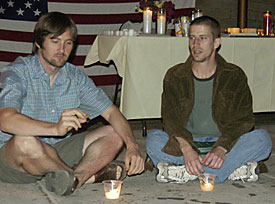 |
|
DANIELLE MALOTT/Arizona Daily Wildcat
|
A group of foreign students lit "burning question" candles last week outside the Tucson Islamic Center in honor of those fighting overseas.
|
|
By Tessa Hill
Arizona Daily Wildcat
Tuesday April 1, 2003
When the war in Iraq began during spring break, many international students who had traveled back home for the week said they faced an extremely difficult decision: whether or not to return to a country at war.
Ivan Amavizca, a Center for English as a Second Language student who spent spring break at home in Mexico with his family, said he thought long and hard about whether or not to come back to the U.S.
"I was a little afraid, but I had to compromise," Amavizca said. "My friends and family kept asking me about it; they were very concerned."
Amavizca said that although he was initially wary of his decision to return to the U.S., now that he is here, he feels completely safe.
With last week's arrival of 26 new CESL students, CESL officials said they anticipate a few students will feel unsure about their safety.
CESL works with 85 students, from 25 different countries, each of whom is enrolled in non-credit English language courses. Despite the successful return of all current students, in the last year CESL officials said program applicants have decreased by 30 percent.
The CESL program is vulnerable to geopolitical concerns, meaning officials are particularly worried about the current war in Iraq, according to CESL officials.
"Everybody's worried," said Helen Abdulaziz, CESL advisor, who added that the program has not lost any students thus far to war-related concerns.
In an e-mail sent to CESL students on March 19, CESL Interim Director Sarah Kim addressed the importance of international students feeling safe, comfortable and voicing any concerns.
"CESL will remain your ╬home away from home,' a place where you can find safety, understanding and respect," Kim wrote in the e-mail.
Despite CESL officials' prediction that not all students would return from spring break, all current CESL students have made the same decision as Amavizca.
Cheick Kalapo, a Muslim CESL student from France, said that he feels relatively safe in the U.S.
"I know the U.S. is a safe country," Kalapo said. "You can see the F-16's in the skies, the police on the roads; you just feel safe."
Despite some American's recent animosity toward the French, Kalapo said he has not and does not anticipate being discriminated against.
Both Kalapo and Amavizca said that although they feel safe, if conditions change, they might once again have to make a decision regarding their stay in the U.S.
"I know things will develop in Iraq, not here Ě but if there is a real threat, a close attempt, then I will go home," Amavizca said. "But, as of now, I'm planning on staying."
Abdulaziz said few students have voiced concerns, and encouraged international students to speak their opinion.
"We addressed the issue since the beginning so students would know where to turn to for help," Abdulaziz said.
Other international student organizations are also prepared for international student safety concerns.
"Some of them are just really afraid, but afraid to voice it," said Jalpa Patel, director of the UA International Student Association.
Patel said there are a number of international students, particularly Muslims, who are seriously considering returning home due to safety issues.
Like CESL, Patel said ISA is encouraging students to comfortably voice both their opinions and concerns with the war in Iraq.
Despite the safe environments offered by both CESL and ISA, Abdulaziz said conflict is possible anywhere on campus.
"If a student feels threatened, they should dial 911 and report the incident, especially if the student is from the Middle East," said Abdulaziz. He also advised to report the incidents to campus anti-discrimination centers.

